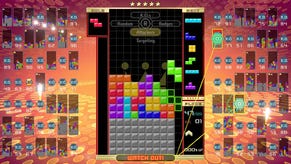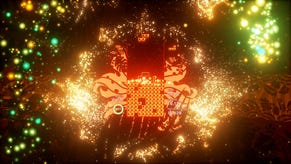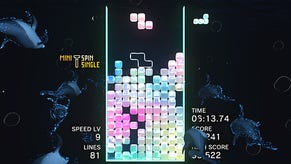Why Tetris Effect Won't Have Competitive Multiplayer According to its Developers
Tetris Effect drops one large of the Tetris legacy while building on another part.
This article first appeared on USgamer, a partner publication of VG247. Some content, such as this article, has been migrated to VG247 for posterity after USgamer's closure - but it has not been edited or further vetted by the VG247 team.
Tetsuya Mizuguchi loves to talk about being in a zone when playing games. His games Lumines and Rez were about putting you in a zone of relaxation. He was in a self-described zone when he played Tetris in the arcades in the late '80s. His latest creation, Tetris Effect, has a "Zone" mechanic wherein time stops as you try to build up a "Decahexatris."
Indeed, Tetris Effect is all about the so-called zone. It offers a fresh take on the classic formula, combining VR with colorful visuals and a thumping EDM soundtrack. Thus, it only makes sense for it to dispense with the competitive multiplayer that has been such a strong part of the original game's legacy to this point. It would take you out of the zone.
Enhance Games representative Mark MacDonald elaborates, "There's no direct head-to-head multiplayer because we don't want something that's gonna stress people out. People would find a way to spell 'f*ck you' in Tetris pieces or something. We just want to make it into a positive thing where you see your friends playing as well."
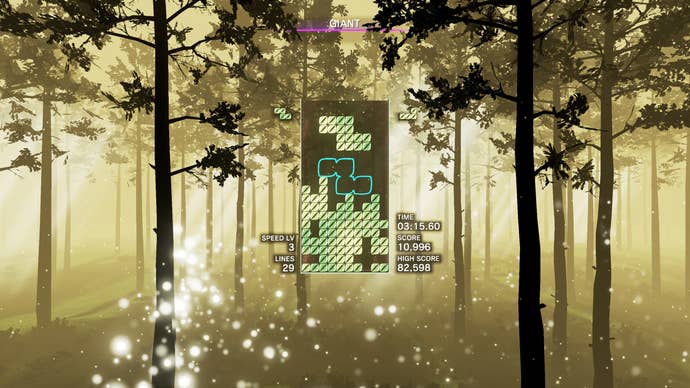
Mizuguchi's alternative is a focus on leaderboards and asynchronous multiplayer. When Tetris Effect launches next month, it will feature special community goals in which players work to achieve a common objective. The upcoming demo, which will be available starting next weekend, will include a special "Weekend Ritual" event that will reward players with a special avatar if they are collectively able to earn enough points.
This approach reflects the odd dichotomy of the series. Tetris is addictive in part because there's a meditative aspect to watching pieces drop at a faster and faster rate to the strains of Hip Tanaka's famous Russian-styled soundtrack. Millions have enjoyed Tetris strictly as a solo experience on one of its dozens of platforms.
But Tetris Effect also has a rich competitive legacy. When the Game Boy launched with Tetris back in 1989, it was partly to promote the packed-in link cable. It was part of the Nintendo World Championships. The Tetris World Championship has been held in Portland since 2010, with the main event being five rounds of single elimination head-to-head matchups.
The current champion is Jonas Neubauer, who has won of the eight tournaments held to this point. "The captivating nature of the game is, you always die, so you're trying to get better to die less, but there's no real perfecting the game," Neubauer told Kotaku. "If you play Final Fantasy VII, you beat the game and you kind of put it down. But it's this weird, open-ended nature of Tetris that kept me coming back."
It's this aspect that tends to surface when Tetris is discussed these days. Puyo Puyo Tetris, which launched on the Nintendo Switch last year, embodies the competitive side of Tetris, even if it's not well-liked among the hardcore set. Its multiplayer focus is in the name, combining two distinct puzzle game flavors and placing them in opposition to one another.
To be sure, Tetris Effect maintains many of the hardcore elements we've come to associate with the series. As a widely-shared video featuring a Tetris master taking on Tetris Effect shows, the quest for a Decahexatris can be very difficult even for an expert. I'm no stranger to Tetris, but I've nevertheless struggled with some of its gnarlier challenges, like a mode that will unexpectedly flip the screen and send the bricks up instead of down.
Tetris Effect still has a Classic Mode, and Miziguchi himself says "the original is still the best." But Tetris Effect also has specially designed playlists built around themes like "Wind" and "Sea" that are meant to immerse you in ambient music. It even has a a "Chill Marathon Mode" with no Game Over, putting lie to the assertion that you "always die" in Tetris.
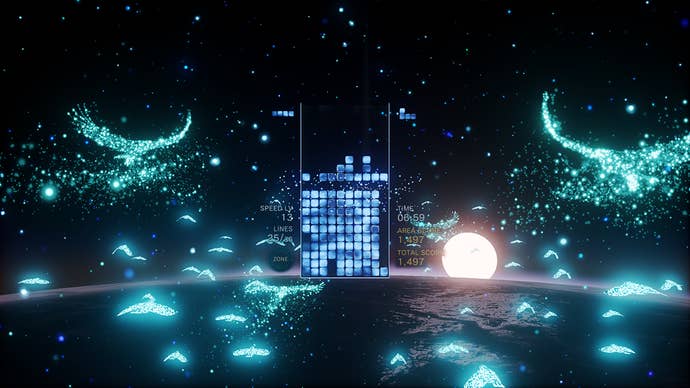
The mandate for this new approach to Tetris comes from its original creators. "When I met [Tetris Company founder Henk Rogers], he said he wanted to make a new type of Tetris," Mizuguchi remembers. "He mentioned Rez and Lumines, and said Tetris has a unique rhythm that puts you in the zone. He explained the zone mechanics to me and how we could create a new type of experience with sound and vision."
This approach isn't totally incompatible with competitive play, but it's easy to understand why Tetris Effect has struck off in another direction. After so many years of making ever faster, more intense variants like Puyo Puyo Tetris, the time was ripe for the series to pivot and try something new. Indeed, to one degree or another, "the zone" Mizuguchi is seeking has always been part of Tetris' DNA. In describing its appeal, Mizuguchi talks about the elegance of its simplicity, how every piece fits together just right. It should be no surprise that some of Mizuguchi's bonding with Henk Rogers and Tetris creator Alexey Pajitnov took place at Burning Man, the desert festival renowned for its intense sensory experiences. Despite working together for the first time, the three have a lot in common.
So while Tetris Effect is temporarily abandoning one aspect of its heritage, it's embracing and enhancing another part. And much as I'll miss squaring off with friends and battling against garbage on my screen, it's the better for it.



